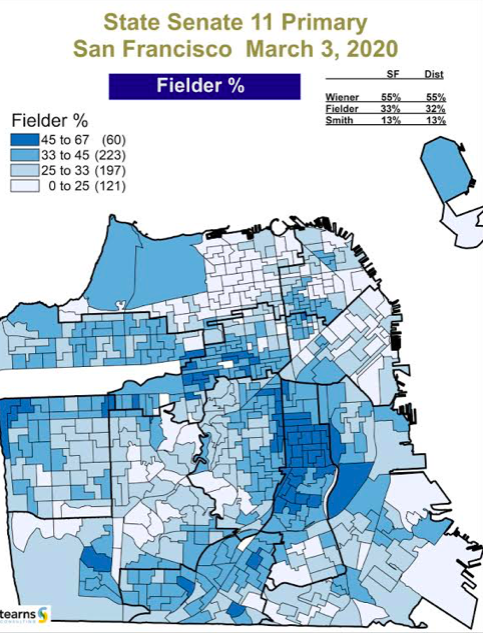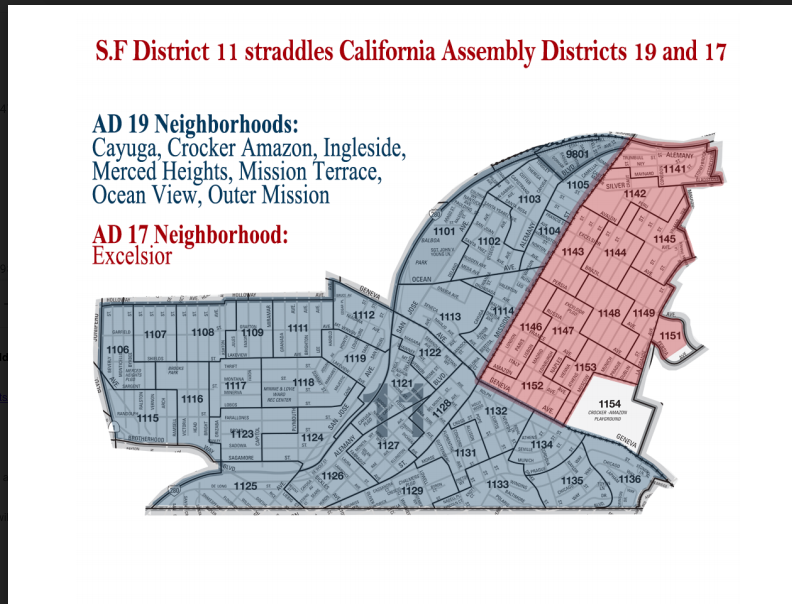The voter turnout is up to 55 percent in San Francisco now, and will exceed 60 percent once the last 54,000 ballots are counted. That’s what today’s results show – and there are only a few changes from yesterday.
But a close analysis of winners and losers shows some fascinating political trends.

The progressive slate is not only dominating the Democratic Party Central Committee voting; its looking possible that Mary Jung, the former party chair who is a lobbyist for the real-estate industry and has been on the panel for years, might not retain her seat.
Jung is in tenth place for ten seats, only 541 votes ahead of School Board member Faauuga Moliga, who has been picking up votes as the count continues.
The vacancy-tax measure is passing by an even-larger margin as the final votes come in, and the limits on office development is far enough ahead that it’s safe to say that one is over.
One judicial race remains close; the latest total puts former prosecutor Rani Singh 75 votes ahead of tenant lawyer Carolyn Gold – a gap of 0.03 percent. Gold was ahead in the last count, so the votes seem to be breaking for Singh – but it’s still way too tight to make any predictions.
So the progressive movement as a whole is a big winner – nearly every candidate and ballot measure that had strong progressive support did well. Some of this may be due to the Sanders-Warren bump – between the two presidential candidates, they got 55 percent of the local vote, so progressives showed up in significant numbers to support them. Biden narrowly edged Warren; the mayor’s candidate, Mike Bloomberg, got only 12 percent of the vote, and that from the richest areas in town.
Still, the DCCC results are interesting.
Help us save local journalism!
Every tax-deductible donation helps us grow to cover the issues that mean the most to our community. Become a 48 Hills Hero and support the only daily progressive news source in the Bay Area.
Joe Fitz at the Examiner points out that two of the leading moderate Dems – Sup. Ahsha Safai and former Sup. Vallie Brown – lost badly in a race that is typically defined by name recognition:
Supervisor Ahsha Safai and former supervisor Vallie Brown both ran for this tiny Democratic Party board, and both are getting their clocks cleaned by newcomers with little-to-no name recognition, and by future potential opponents as well.
Safai, in particular, netted incredibly low results compared to his rumored rival, former supervisor John Avalos, in the upcoming 2020 November election to defend his District 11 seat.
As of Wednesday’s newest Department of Elections count, Avalos had received 27,586 votes, while Safai earned just 10,200. If the vote pattern holds, Safai will lose this tiny little election where ten seats were up for grabs.
That’s absolutely bonkers for a sitting member of the Board of Supervisors in San Francisco.
Let’s look a little deeper.
It’s no surprise that the top five candidates in Assembly District 17 are widely known politicians with deep roots: Jane Kim, David Campos, John Avalos, Hillary Ronen, and Matt Haney were well ahead of everyone else.
But next on the list are Frances Hsieh, Honey Mahogany, and Annabel Ibanez. Hsieh is a DCCC incumbent, but Mahogany and Ibanez are newcomers who have never held or run for local office before.
Then comes Shanell Williams, a City College trustee who was elected in a citywide race, and Peter Gallotta.
In 11thplace? Sup. Rafael Mandelman. Sup. Shamann Walton is even further down the list, in 20thplace, just two slots ahead of Brown, who had less than half the votes of Kim, Campos, Ronen and Haney.
On the west side of town, where ten DCCC members will be elected, Safai was in 14thplace.
The Social Justice Democrats, who will now dominate the party panel, had money and a solid slate, and since a lot of voters don’t know most of the candidates, the organized slate made a huge difference.
But if this race is a glance at the popularity of elected officials and their allies, it appears that Safai, at least, is potentially in political trouble.
The D11 votes show the incumbent supervisor got 2,536 votes and Avalos got 1,561. But that’s misleading since D11 is split between two Assembly districts, and most of the vote is in D19, where Safai ran.

There are 33 D11 precincts in AD 19, and 12 in AD 17. So if we adjust for that difference (Avalos was running in just 25 percent of the district), Avalos actually beat Safai in the district by more than 2-1. (Kind of geeky math, but multiply the Avalos vote by four and the Safai vote by 1.33, and you get Avalos 6,244 and Safai 3,062.)
That’s not a great sign for the incumbent.
For Brown, who is talking about running against Sup. Dean Preston for her old seat, the outcome can’t be encouraging either. Brown got 4,148 votes in her home district; Hillary Ronen, a big Preston supporter, got 5,518 votes in D5. David Campos, also a Preston supporter, got 5,861 votes in D5.
State Sen. Scott Wiener, of course, is well ahead, as we all expected; he’s got 56 percent of the vote. But that’s low for a powerful well-funded incumbent running against a person who has never held or run for office before.
And it’s interesting to look at where Jackie Fielder, his opponent, won votes. She clearly was popular in the most progressive districts – but also ran strongly in some parts of the west and southwest, suggesting that Wiener’s housing proposals (and that’s what this race was and will be about) are unpopular in more than just the liberal precincts.
The other message that came out of this election is that the endorsement of Mayor London Breed is not terribly helpful right now. Breed backed Bloomberg, who tanked, and that may have nothing to do with the mayor; he was going to tank in San Francisco anyway.
But the candidates aligned with the mayor overall did badly.
That’s not unusual – San Francisco mayors traditionally have limited coattails. But to the extent that this election was a plebiscite on how the current administration and the people who are part of its political agenda are seen by the voters, Breed is in trouble.




